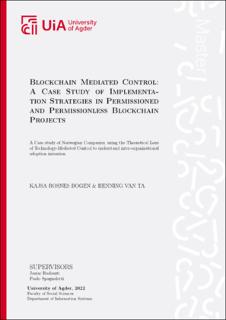| dc.description.abstract | Blockchain could improve existing business processes by enabling networks of users, businesses, partners, and others to execute transactions trusted through cryptography, decentralization, and consensus. The financial technology (fintech) industry has been the first adopter of blockchain technology, which has set an example for other industries to translate blockchain’s unique attributes to other use cases. However, blockchain could disrupt existing organizational governance and decision-making. Lacking knowledge of the complex landscape in which blockchain operates, concerns arise, driving organizations and researchers alike to investigate technological- and organizational outcomes. In this dissertation, we investigate how Blockchain can function as a Technology-Mediated Control technology and how this can affect network participants. To evaluate various adoption intentions, we employ a case study in conjunction with a literature review. Interviews with project managers from various Norwegian organizations utilizing either permissioned or permissionless blockchains provided us with their perspective on the processes and potential structural changes. Legacy systems in processes outside the jurisdiction of the respective organizations was a common concern, according to both research papers and interviews. Consequently, the maturity of technological factors is a significant barrier for organizations to implement blockchain, necessitating a new standard of cooperation
between organizations. According to the research, the most significant contribution is the theory of blockchain-mediated control, whereas blockchain functions as the technology that mediates control. In addition, we identified a potential risk propagation within the theory that eludes current solutions: the oracle problem in smart contracts. | |
